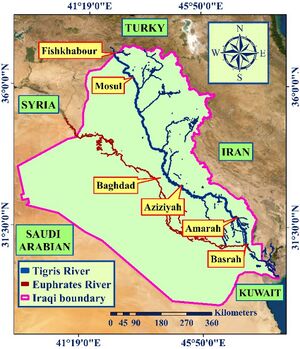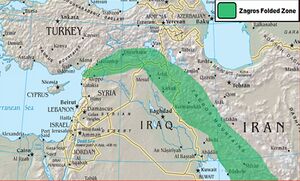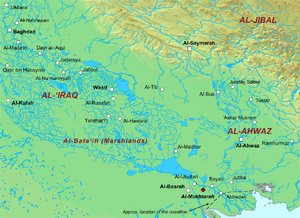Basra Iraq
| Author:Laxman Burdak, IFS (R) |



- For clan see Basra
Basra (Hindi:बसरा, Arabic: البصرة; BGN: Al Baṣrah) is city of Iraq.
History
It is the country's main port and the capital of the Basra Governorate. Baṣra played an important role in early Islamic history, and it was the first city built in Islam 14 A.H (After Hijra)
The present city was founded in 636 as an encampment and garrison for the Arab tribesmen constituting the armies of amir `Umar ibn al-Khattab, a few kilometres south of the present city, where a tell still marks its site. While defeating the Sassanid forces there, the Muslim commander Utba ibn Ghazwan first set up camp there on the site of an old Persian settlement called Vaheštābād Ardašīr, which was destroyed by the Arabs. The name Al-Basrah, which in Arabic means "the over watching" or "the seeing everything", was given to it because of its role as a Military base against the Sassanid empire. Other sources however say its name originates from the Persian word Bas-rāh or Bassorāh meaning "where many ways come together".
Sir H. M. Elliot[1] writes that merchant named Sulaimán embarked on the Persian Gulf, and made several voyages to India and China. This bears the date 237 A.H. (851 A.D.). Abú Zaidu-l Hasan, of Síráf, a connoisseur, although never travelled in India and China, made it his business to modify and complete the work of Sulaimán, by reading, and by questioning travellers to those countries. Mas'údí met this Abú Zaid at Basra, in 303 A.H. (916 A.D.), and acknowledges to have derived information from him, some of which he reproduced in his "Meadows of Gold."
Jat History
According to Ram Sarup Joon Basra was an Ancient Kingdoms of the Jats (Sindhu Jats) in 6th Century. [2]
Prof. B.S. Dhillon[3] writes quoting Sykes, P., (Sir and Brig. Gen.)[4]: He said, "Under the orders of Walid I, at the beginning of the eighth century A.D., a large number of Jatts had been transported with their buffaloes from the lower Indus (river) to the marches of the Tigris (river in modern Iraq). Soon after establishing in the new land, they started to rob and to kill. They closed the Basra-Baghdad road which led to very high food prices in the capital, as the result successive Caliphs (governors) sent their armies to subdue them. The famous Persian poet, Tabari, expressed their insolence in the following poem:
- O people of Baghdad die!
- May your dismay last for forever!
- We Jats have defeated you, by forcing you to battle with us in the open country.
- We Jats have driven you in front of us like a flock of weaklings.
At the beginning Arab generals were unsuccessful to subdue them and ultimately one Arab general (A.D. 834) was successful to cut Jat communications which resulted in their surrender. Jats were exiled because of their revolt to Khanikin on the Turkish frontier and to the frontiers of Syria".
External links
References
- ↑ The History of India, as Told by Its Own Historians/I. The Merchant Sulaimán and Abú Zaid,p.2-3
- ↑ History of the Jats/Chapter III, Page-44
- ↑ History and study of the Jats/Chapter 3,p.59
- ↑ Sykes, P. (Sir and Brig. Gen.), A History of Persia, Macmillan & Co. Ltd., London, reprinted in 1958, first published in 1915, pp.10-11, (Vol. II).
Back to Jat Places in Foreign

